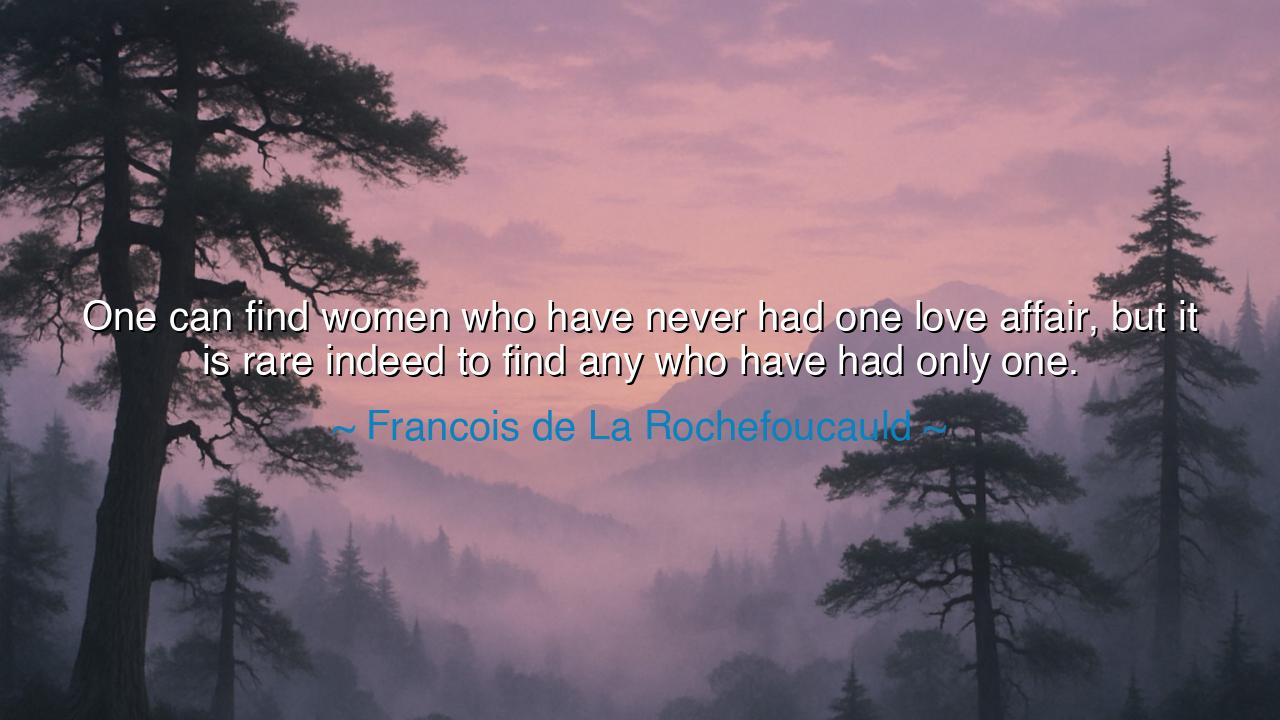
One can find women who have never had one love affair, but it is
One can find women who have never had one love affair, but it is rare indeed to find any who have had only one.






Hear now the words of François de La Rochefoucauld, master of the sharp mirror of the heart: “One can find women who have never had one love affair, but it is rare indeed to find any who have had only one.” This is no mere jest, but a piercing insight into the restless nature of human desire. He speaks not to belittle, but to reveal the truth that passion, once awakened, seldom rests in the embrace of a single flame. For love is a river: it may lie hidden beneath the earth, but once its waters burst forth, they carve many paths, touching many shores.
The origin of this saying lies in the salons of seventeenth-century France, where La Rochefoucauld observed the courtiers and noblewomen of Paris. Behind the painted masks and measured steps of courtly grace, he saw the tumult of the heart, the longing for affection, and the hunger for newness. In those gilded halls, love affairs bloomed like roses, not one by one, but in clusters, each scent fading into the next. To love once is a seed; to love again and again is the nature of the soil in which humanity is planted.
Consider the tale of Cleopatra, queen of Egypt. History remembers her not for a single lover but for the fire she carried into the lives of two great Romans—Julius Caesar and Mark Antony. She was not fickle, nor shallow, but a spirit too vast to be confined to a solitary bond. Her life shows us the truth of La Rochefoucauld’s words: it is rare to find one whose heart has been stirred once and only once, for passion demands continuance, and the soul seeks new mirrors in which to behold itself.
And yet, let us not imagine this truth applies to women alone. It is the human heart itself that resists stillness. Men, too, are driven by the currents of affection, drawn from one harbor to another. The philosopher speaks of women, but behind his words lies a universal principle: the nature of desire is to multiply, to wander, to grow restless when confined. For love is not a statue, but a flame—bright, consuming, and forever in search of new air.
What then is the lesson? Not to scorn the many paths of passion, nor to shame the heart that has known more than one bond. Rather, it is to understand that love is both fragile and abundant. One must tread with wisdom, lest the heart become a field trampled by too many footsteps. The rarity of “only one” is not a curse, but a reminder: fidelity is a jewel found by discipline, not by chance.
To the youth, I say: be neither arrogant in your first love, nor careless in the loves that follow. Guard your heart, and give it wisely. Do not confuse desire with destiny, nor passion with permanence. To the mature, I say: cherish what remains, honor what has been, and know that the past loves of your soul do not diminish you, but have carved you into the person you now are. Each bond, each loss, each flame, has given shape to your inner being.
Let every man and woman take this as their guide: do not despise the multiplicity of the heart’s journey, but strive to turn its wanderings into wisdom. Remember that love affairs may be many, but loyalty, compassion, and truth are rarer still. Seek not merely the intoxication of passion, but the endurance of devotion. In this way, even if you have known many, your heart shall be unified, strong, and radiant with a single truth.
Thus, La Rochefoucauld’s words endure, not as a jest of cynicism, but as a lantern of clarity. They remind us that the heart is restless, but also capable of greatness. To know this is to walk wisely in the labyrinth of love, and to emerge not merely with stories of passion, but with a life of meaning. For in the end, what matters is not the number of love affairs, but the depth of the soul that has walked through them.






AAdministratorAdministrator
Welcome, honored guests. Please leave a comment, we will respond soon